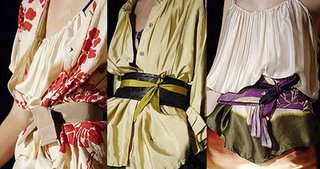 While Anshu Arora looked to Japan, couturier Sonam Dubal ventured closer home. In this collection titled 'Cosmic Romance', Dubal brought alive visions of Tibetian and Sikkimese textile traditions.
While Anshu Arora looked to Japan, couturier Sonam Dubal ventured closer home. In this collection titled 'Cosmic Romance', Dubal brought alive visions of Tibetian and Sikkimese textile traditions.The austere landscape and traquil elegance of the region were the essence of this very wearable collection. Dubal's strength lies in creating silhouettes that are pan-Asian in style.
The designer has long been a promoter of the traditional Tibetian raw silk colloquially termed burrey or tsen which is handwoven in south
 Assam. His fabrics are layered and embroidered both by hand and machine, with surface embellishment through silk-stitched stripes and floral embroidery explorations in resham (silk yarn) to create a carpet weave like quality reminiscent of Western Asia.
Assam. His fabrics are layered and embroidered both by hand and machine, with surface embellishment through silk-stitched stripes and floral embroidery explorations in resham (silk yarn) to create a carpet weave like quality reminiscent of Western Asia.Tsen along with crepe de chine formed the basis of this 55 ensemble collection, while colours ranged from muted tones with touches of gray, black and cream, broken with some rust, burgundy, deep red, orange, cobalt blue and black.
Seen alongside is a sublime ensemble, carried by model Bhavan Kapoor. I simply love the refinement of line, and balance of shapes, contrast, embroidery and stripe. Take away the kimono style jacket and the resulting look is very street chic.

For contemporary chic Dubal had a rust embroidered Nepalese top worn with a circular embroidered bakhu skirt. Subtle drama was generated with a black coat with black honju dotted pyjamas and striped obi belt.
| Trend Tip: |
With this collection at Lakme fashion Week, Sonam Dubal succeeded in reminding us that there is indeed much beauty and romance in rustic threads.
The Bakhu and Honju

The Bhutias are people of Tibetan origin that migrated to Sikkim perhaps somewhere after the fifteenth century. In Northen Sikkim, where they are the major inhabitants, they are known as the Lachenpas and Lachungpas. The language spoken by the Bhutias is Sikkimese.
The traditional dress of the male member is known as the Bakhu which is a loose cloak type garment with full sleeves. The ladies dress consists of a silken Honju which is a full sleeve blouse and a loose gown type garment. The ladies are very fond of heavy jewelry made of pure gold.
Source: www.sikkim.nic.in
No comments:
Post a Comment